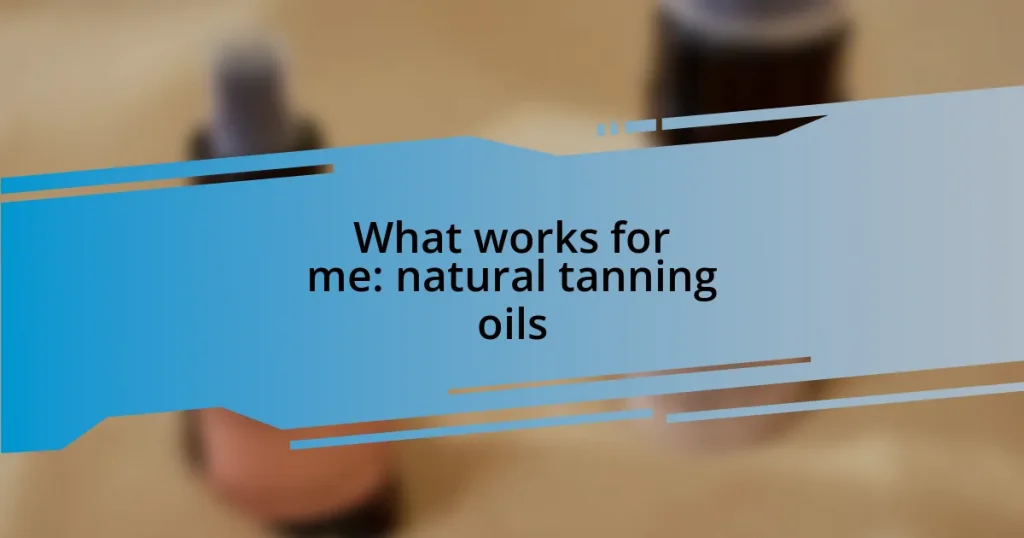Key takeaways:
- Organic sunscreens provide a safer alternative to chemical options, utilizing natural ingredients like zinc oxide and titanium dioxide for effective UV protection.
- They benefit both skin health (reducing irritation and allergic reactions) and the environment by avoiding harmful chemicals that damage marine ecosystems.
- Key ingredients often include soothing elements like aloe vera and coconut oil, enhancing the overall skincare experience.
- Proper application techniques, such as reapplying every two hours and covering overlooked areas, are crucial for optimal sun protection.

Introduction to Organic Sunscreens
When I first ventured into the world of organic sunscreens, I was overwhelmed by the sheer variety available. What really caught my attention was the growing concern over chemical sunscreens, particularly their impact on both our health and the environment. Have you ever wondered about the ingredients you’re applying to your skin every day?
I remember the first time I tried an organic sunscreen. The texture was different—rich but non-greasy—making it a pleasant surprise. Unlike conventional options, organic sunscreens often use natural minerals like zinc oxide and titanium dioxide, which provide a physical barrier against harmful UV rays. This difference not only gave me peace of mind but also made me feel like I was doing my part to protect the environment.
With so much talk about what’s in our skincare, the allure of organic sunscreens is undeniable. It invites a conversation about sustainability and our choices. Do we prioritize effectiveness or safety? Finding a balance is essential, and organic sunscreens seem to offer a better path toward protective skincare that aligns with a more eco-conscious lifestyle.

Benefits of Using Organic Sunscreens
Organic sunscreens offer numerous benefits that enhance not only your skin protection but also overall well-being. For instance, I noticed my skin responded positively to the natural ingredients—no irritation or breakouts. This was a refreshing change as I had often dealt with harsh reactions from chemical formulas. Knowing that I was applying safe and gentle substances to my skin felt liberating. Have you ever stopped to consider how the ingredients can influence your skin’s health?
Beyond personal skin health, I appreciate how organic sunscreens are often better for the environment. Many conventional sunscreens contain ingredients that harm marine ecosystems, particularly coral reefs. When I learned that many organic options are free from harmful chemicals like oxybenzone, it made me feel empowered. I felt like I was making a responsible choice that went beyond my skin. It’s this ripple effect—protection for both my body and the planet—that resonates deeply with me.
Lastly, the broad spectrum of organic sunscreens often comes with added benefits such as moisturizers and antioxidants derived from natural sources. When I use an organic sunscreen that includes aloe vera or coconut oil, it’s almost like treating my skin to a nourishing lotion rather than just sunscreen. This multi-functional approach suits my busy lifestyle, where I seek products that offer more than one benefit. How about you? Have you found that organic products simplify your skincare routine?
| Benefit | Details |
|---|---|
| Skin Health | Utilizes natural ingredients, reducing the risk of irritation and allergic reactions. |
| Environmentally Friendly | Free from harmful chemicals, protecting marine life and ecosystems. |
| Multi-functional | Often includes added moisturizers and nutrients, serving dual purposes in your skincare routine. |

Key Ingredients in Organic Sunscreens
When I dive into the ingredients of organic sunscreens, I often find myself reflecting on the purity of what I’m putting on my skin. One standout component is zinc oxide, which not only effectively blocks UVA and UVB rays but also feels comforting on the skin. I remember my first experience using a formula rich in this ingredient—it was like my skin could finally breathe.
Here are some key ingredients often found in organic sunscreens:
- Zinc Oxide: A natural mineral that provides broad-spectrum sun protection.
- Titanium Dioxide: Another mineral effective at blocking harmful UV rays and gentle on the skin.
- Aloe Vera: Known for its soothing properties, it hydrates while protecting against sunburn.
- Coconut Oil: A natural moisturizer that enhances skin hydration and adds a touch of nourishment.
- Green Tea Extract: Contains antioxidants that help fight skin damage and soothe irritation.
In my exploration of organic sunscreens, I’ve also encountered various botanical extracts that elevate the experience. Recently, I tried a product with raspberry seed oil, which claims to provide additional UV protection while delivering surprisingly rich hydration. The moment I applied it, I was struck by its light feel and pleasant scent, reminiscent of summer days. It reminded me that skincare could be an enjoyable ritual, not just a chore.
These ingredients reflect a commitment to both skin health and environmental care, making the decision to switch to organic options feel rewarding—not just for my skin, but for the planet.

Application Tips for Effective Protection
When applying organic sunscreen, I’ve found that timing is everything. I usually start by applying it generously about 15 to 30 minutes before heading outdoors. This waiting period allows the sunscreen to absorb into my skin effectively and provides optimal protection. Have you ever rushed out only to feel the sun’s rays hitting your skin too soon? Trust me, that initial delay can make a world of difference.
I also make it a point to reapply every two hours, or more often if I’m swimming or sweating. I remember a beach day when I got caught up in fun and forgot to reapply. The result was a painful sunburn that taught me a valuable lesson. Keeping a travel-sized tube in my bag has become a game changer. It’s a small effort that pays off tremendously in the long run, ensuring I stay protected while enjoying my time in the sun.
Don’t forget to apply sunscreen to often-overlooked spots, like the tops of your ears, the back of your neck, and even your feet. I experienced a nasty burn on my ears once, and it was utterly uncomfortable! It’s incredible how these little areas can be so sensitive. By being thorough in my application, I now feel secure that I’m giving myself comprehensive protection against those relentless rays. How do you make sure you cover all bases?

Top Recommended Organic Sunscreens
When it comes to my go-to organic sunscreens, I can’t help but rave about Badger Balm Organic Sunscreen. It’s a mineral sunscreen with a thick consistency but glides on smoothly. I remember the first time I used it during a hike; not only did it protect my skin flawlessly, but it also provided a nourishing feel. How often do you find a product that feels good while working hard?
Another favorite of mine is SunBum Mineral Sunscreen. What attracted me was its delicious coconut scent, reminiscent of tropical beaches. To my delight, it doesn’t leave a white cast, which is a common downside of mineral options. I took it on a weekend getaway, and I was pleasantly surprised by how well it held up during a long day at the beach. Have you ever wished for a sunscreen that also adds to your experience rather than just feeling like an obligation?
Lastly, I often recommend Alba Botanica Very Emollient Sunscreen. This product has a lightweight feel that makes reapplication a breeze throughout the day. I’ve used it while playing tennis, and it truly impressed me—no greasy residue or irritations. The comforting blend of aloe vera and coconut oil made my skin feel pampered. There’s something magical about finding a sunscreen that enhances your activities rather than hindering them, don’t you think?

Conclusion on Organic Sunscreens
Using organic sunscreens has been a game changer for me, not only in terms of skin protection but also in peace of mind. I remember the first time I switched to an organic option; I felt relief knowing I was applying fewer chemicals to my skin. Doesn’t it feel great to know that what you’re putting on your body is more natural and better for the environment?
Over time, I’ve noticed that my skin reacts much more positively to organic ingredients. There’s a certain comfort in reading the label and recognizing each ingredient, knowing they serve a purpose. It’s almost like having a conversation with myself about what I truly want for my skin—doesn’t that make you rethink the connection between beauty and health?
Ultimately, choosing organic sunscreen is about prioritizing what’s best for your skin and the planet. I often think about the long-term effects of the products I use. Isn’t it worth putting that extra effort into understanding and selecting safer options? By making conscious choices, I feel empowered in my skincare routine—how about you?
















